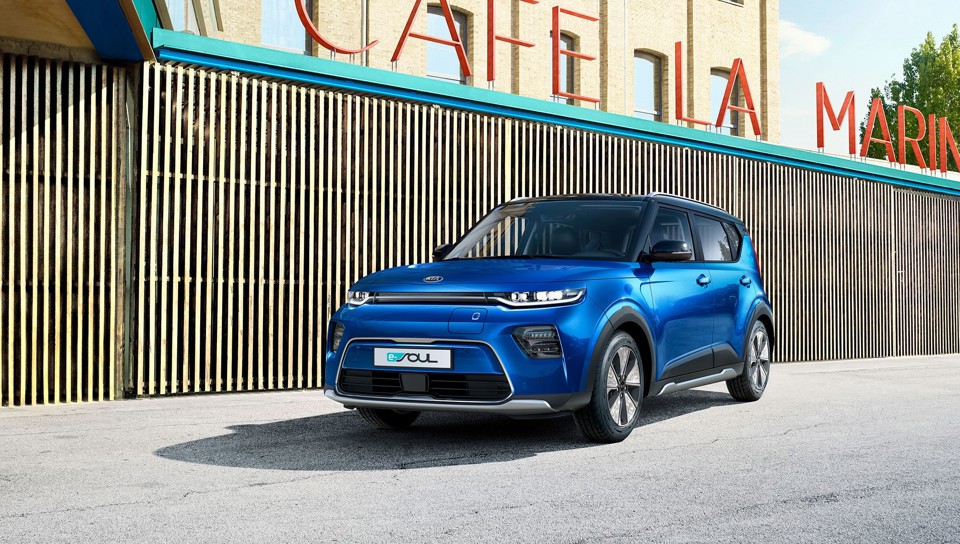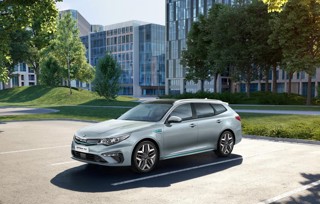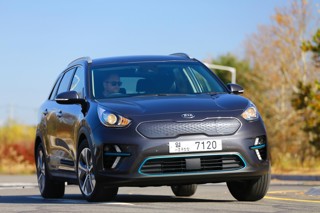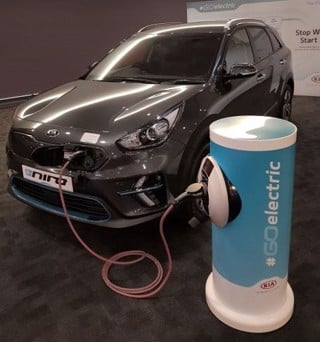The all-new Kia Soul EV will make its European debut at the 2019 Geneva International Motor Show next month.
In its third generation, it will be powered in Europe exclusively by electric energy, with a choice of two long-range, zero-emission powertrains.
The new-generation battery packs powering the Soul EV are up to 30% more energy efficient than Europe’s current best-selling electric vehicle, claims the manufacturer.
Emilio Herrera, chief operating officer for Kia Motors Europe, said: “Since its inception, the Soul has been a true pioneer for Kia, and for the wider market.
“A decade ago, it established the urban crossover segment, and when we launched the Soul EV it became the first fully-electric crossover.
“The all-new Soul EV breaks more ground, as we launch it in Europe with an extended-range electric powertrain as standard – without the option of an internal combustion engine.”
In 2018, the outgoing model’s final year on-sale, Kia sold more of the zero-emissions Soul EV in Europe than petrol and diesel versions combined.
Herrera continued: “Kia is recognised today as a global leader in electrified vehicles, with a growing range of mild-hybrid, hybrid, plug-in hybrid and electric vehicles.
“Electrified models accounted for one in eight Kia cars sold in Europe in 2018, up from one in ten in 2017, and the Soul EV will further build on this momentum.”
Like all Kia models, the Soul EV will be sold as standard in Europe with a seven-year, 100,000-mile warranty, which also covers the car’s electric motor and battery pack.
The Soul EV goes on-sale across Europe towards the end of the first quarter of 2019. UK specification, on-sale date and pricing will be announced in due course.
At 4,195 mm in length, the Soul EV is 55 mm longer than the car it replaces – with a 2,600-mm wheelbase (+30 mm) and a 15-mm longer front overhang.
It will be available in a choice of seven single-tone paint finishes and seven two-tone combinations, mixing bright body colours with metallic shades for the roof and door mirror caps.
European customers can also specify an optional SUV Pack, which elevates the design of the Soul EV with the addition of bolder wheel arch and side sill cladding, as well as a skid plate on the base of the front bumpers.
A choice of two fully-electric powertrains
The Kia Soul EV will be sold in Europe exclusively as an electric vehicle, with a choice of two fully-electric, zero-emission powertrains to meet the needs and budgets of different customers.
Drivers have a choice of long-range (64 kWh) and standard-range (39.2 kWh) powertrains. Whichever version a buyer chooses, both variants offer vastly improved range over the outgoing Soul EV.
On-road performance is also enhanced, with significantly more powerful electric motors providing 395 Nm of torque – 39% more than before.
Cell energy density of 250 Wh/kg, achieved through new cell chemistry, enable the cells to store 25% more energy within a defined volume than those of the 200 Wh/kg battery pack in the outgoing Soul EV. This has enabled Kia to keep the battery pack as compact and lightweight as possible, while taking a huge leap in the car’s zero-emissions driving range compared to its predecessor.
The long-range 64 kWh battery pack is paired with a 150 kW (204 ps) electric motor, enabling the Soul EV to travel up to 280 miles (452 kilometres) on a single charge (on the WLTP combined cycle).
Energy consumption for the 64 kWh battery pack is just 157 Wh/km on the WLTP combined cycle. Energy consumption for the long-range Soul EV is as low as 109 Wh/km in urban environments (WLTP urban cycle).
With the powertrain’s maximum 395 Nm torque available from a standstill, and 84% more power than the car it replaces, the long-range 64 kWh Soul EV will accelerate from 0-to-100 kph in just 7.6 seconds.
The standard-range 39.2 kWh battery pack powers an efficient 100 kW (136 ps) electric motor. With peak torque of 395 Nm, and 23% more power than the outgoing Soul EV, the significantly improved efficiency of the battery nevertheless enables the standard-range Soul EV to travel up to 172 miles (277 kilometres) on a single charge.
Energy efficiency is rated at 145 Wh/km (WLTP combined), 30% more efficient than the best-selling electric car in Europe – making it one of the most energy-efficient electric vehicles in the world.
A Combined Charging System (CCS) DC fast charger is fitted as standard to both models, enabling shorter stops for charging. Both battery packs can be recharged from 20% up to 80% capacity in just 42 minutes from a 100 kW DC fast-charger.
The Soul EV is fitted with a range of energy-recuperation technologies to maximise driving range. It is also equipped as standard with Kia’s innovative regenerative braking system, operated by paddle shifters behind the steering wheel.
The system provides drivers with the ability to slow the car and recuperate kinetic energy to maximise its driving range and efficiency.
Drivers can choose from five regenerative braking levels (none, one to three, or ‘single pedal’ mode), depending on the level of energy recuperation they desire from the brakes.
The system’s ‘single pedal’ driving mode also allows the car to harvest the maximum amount of energy from its brakes, and even enables the driver to bring the car to a gentle halt without necessarily needing to push the brake pedal.
The regenerative braking system can also automatically adjust the braking level if it detects the car in front slowing down, creating smoother coast-down driving – especially on a steep downhill road.
A Smart Eco Pedal Guide display on the driver’s instrument cluster also keeps the driver aware of real-time battery usage based on accelerator pedal input.
In addition, the Soul EV’s Drive Mode Select system lets drivers adapt the car to their preferred style or the road conditions. Drivers can choose from ‘Normal’, ‘Eco’, Eco+’ and ‘Sport’ mode.
The two Eco modes are tuned to maximise vehicle range with certain power-saving measures, while Sport mode increases responses from the steering and electric motor to maximise the dynamic driving feel of the car. Normal mode provides a careful balance between each.
Uvo Connect telematics system
Furthermore, the new model is the first Kia in Europe to offer the brand’s innovative Uvo Connect telematics system.
Uvo Connect is designed to bring driving into the digital era, connecting drivers to the world around to provide them with invaluable information – via the in-car touchscreen, and on their smartphone.
UVO features the Kia Live system, housed within the 10.25-inch TFT LCD widescreen in the centre of the Soul EV’s dashboard.
The system uses its own SIM card to retrieve and update live data during a drive, such as live traffic information, weather forecasts, points of interest, and details of potential on- and off-street parking – including price, location and parking availability.
Crucially, the UVO system also shows drivers charging station locations, charger availability, and connection compatibility.
The second element of the UVO system is the UVO App, designed for compatibility on Android and Apple smartphones.
The app offers users peace of mind with a range of features to provide diagnostic data about their car and the trips they take. It also enables owners to activate a range of remote functions and features remotely.
Depending on country, users can remotely activate the climate control system (pre-heating or pre-cooling the car, depending on the weather), and send route directions to their car before a journey.
The app enables users to check battery charging status remotely, and stop or resume charging at a tap of a screen – allowing them to take advantage of cheaper overnight electricity tariffs if charging at home. The app also lets users check the location of their vehicle, and access vehicle reports and diagnostic notifications.
Following its introduction on the Soul EV, Kia’s Uvo Connect technology will be introduced to other European models in the near future.
The new Soul EV is produced at Kia’s Gwangju manufacturing facility in Korea. It goes on-sale in selected European markets from the end of Q1 2019. UK specification, on-sale date and pricing will be announced in due course.
























Devon Guy - 26/02/2019 22:29
A timely move in the right direction which is quite likely to get more BEVs into fleets. Kia are clearly signposting that they want to capture and dominate this part of the market, so expect to see some competitive pricing once these cars are launched. It sort of feels the European marques are trailing 12 to 24 months behind and I suspect won't be able to compete on price.